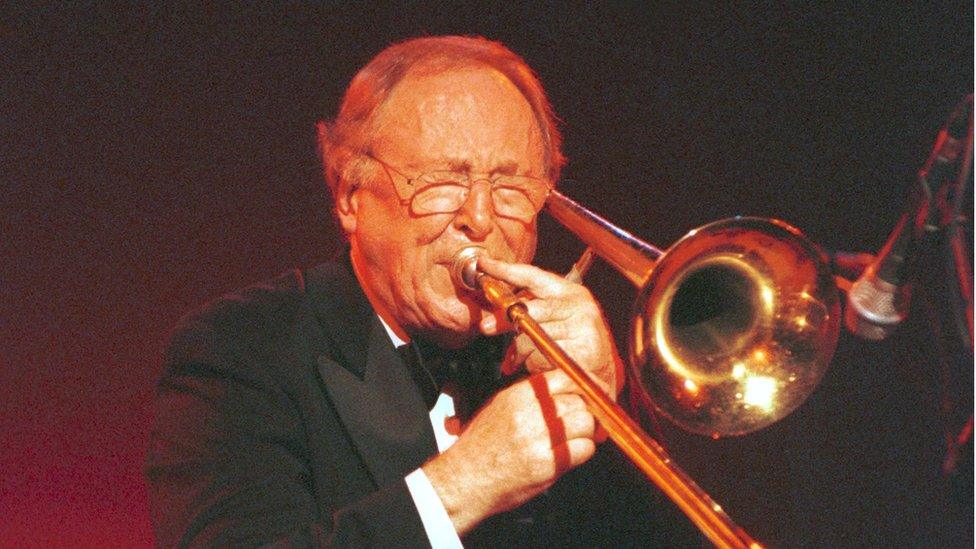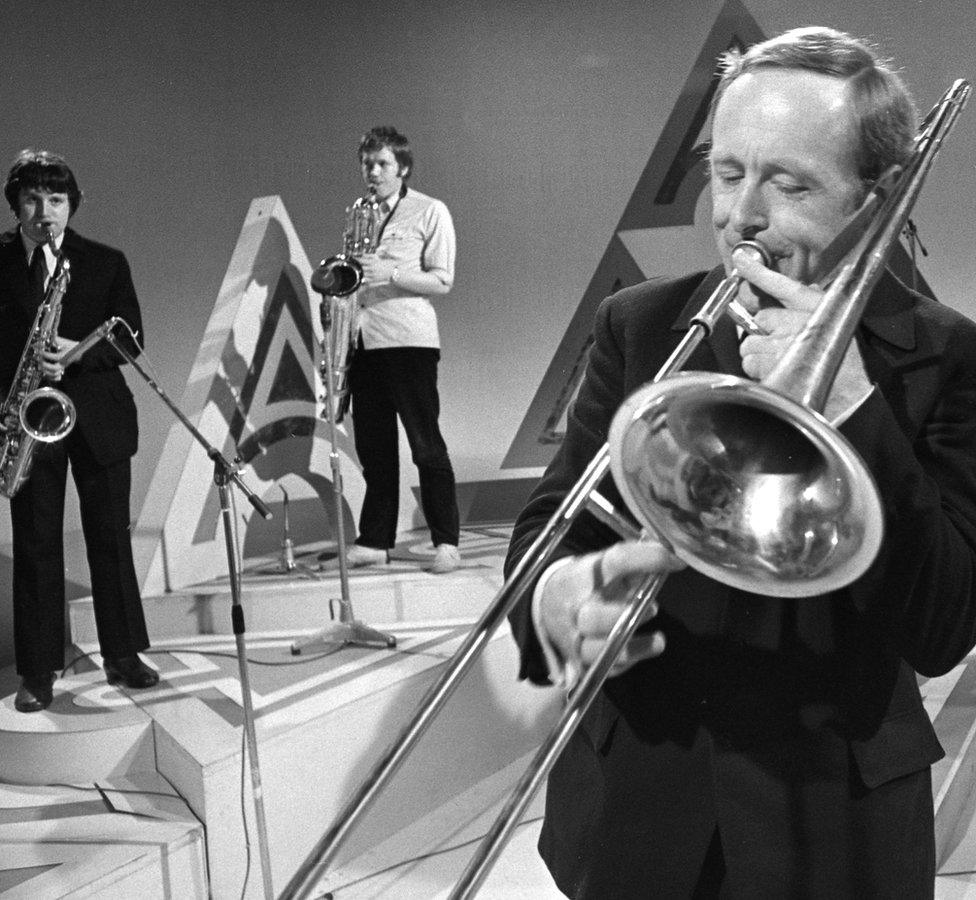Tributes paid to 'jazz giant' Chris Barber
- Published

Barber was one of the UK's most influential jazz musician
One of the leading figures in British and European jazz, the trombonist Chris Barber, has died at the age of 90.
A champion of trad jazz, he also laid the foundations for the 60s rock scene by covering Leadbelly's Rock Island Line with Lonnie Donegan in 1954.
The song sold a million copies and popularised the British skiffle scene that inspired the Beatles, the Rolling Stones and Eric Clapton.
He died peacefully in his sleep after suffering with dementia.
"Without a doubt, he transformed the music scene in the UK and unlocked the door for a new generation of musical adventurers who in turn, continue to inspire," wrote his record label, The Last Music Company, on Facebook, external.
"We will never see his like again."
Lyricist Sir Tim Rice also paid tribute, acknowledging Barber's "formidable influence" and calling him a "star player".
Allow X content?
This article contains content provided by X. We ask for your permission before anything is loaded, as they may be using cookies and other technologies. You may want to read X’s cookie policy, external and privacy policy, external before accepting. To view this content choose ‘accept and continue’.

The E Street Band's Steve Van Zandt called him "the Godfather of British Rock, external"; while Billy Bragg reflected on his "crucial" role in "the birth of the skiffle" and in bringing "US blues artists to British audiences in the 50s & 60s".
Comedian and skiffle historian Mark Lamarr added: "I knew him well and would often visit him at his home. You couldn't wish to meet a kinder, considerate, intelligent and above all musical gentlemen."
Allow X content?
This article contains content provided by X. We ask for your permission before anything is loaded, as they may be using cookies and other technologies. You may want to read X’s cookie policy, external and privacy policy, external before accepting. To view this content choose ‘accept and continue’.

Allow X content?
This article contains content provided by X. We ask for your permission before anything is loaded, as they may be using cookies and other technologies. You may want to read X’s cookie policy, external and privacy policy, external before accepting. To view this content choose ‘accept and continue’.
Born in 1930 in Welwyn Garden City, Hertfordshire, Barber's interest in trad jazz - the hot and vibrant New Orleans sound - began after he was evacuated during the Second World War and started collecting American records.
He formed his first band after the war in London, while studying trombone and double-bass at the Guildhall School of Music.
Joined by trumpeter Ken Colyer in 1953, they had a minor hit with The Isle Of Capri - but the partnership soon floundered, and Colyer was replaced by Pat Halcox, who remained Barber's musical partner for 54 years.
Rock Island Line emerged during the band's live shows, where banjo player Lonnie Donegan would play skiffle interludes between the main sets. They recorded their cover in 1954, and a year later it unexpectedly became one of the most-requested records on BBC radio, leading to a single release on Decca.
"For teenage Britain, it was the most influential record of the decade," wrote Bob Stanley in his history of British pop, Yeah Yeah Yeah. "When British teens realised they could make it onto the radio by mastering a broomstick and a kazoo, the revolution commenced".
"Without Chris Barber," Rolling Stones bassist Bill Wyman later observed, "the Stones and The Beatles would not be where they are now".
Paul McCartney repaid the favour by giving Barber an unused Beatles song, Cat Call, in 1967, and playing organ on the track.
Allow YouTube content?
This article contains content provided by Google YouTube. We ask for your permission before anything is loaded, as they may be using cookies and other technologies. You may want to read Google’s cookie policy, external and privacy policy, external before accepting. To view this content choose ‘accept and continue’.
The Chris Barber Band's biggest hit was 1959's Petite Fleur, which showcased a laid-back but heartfelt clarinet solo by Monty Sunshine. It sold more than 2.5 million copies and propelled the band to international stage, with Barber becoming known as "the man who brought Trad back to America".
He went on to perform more than 15,000 concerts in 50 different countries and, in the 1950s and 1960s, brought some of America's most influential blues musicians over to the UK - including Howlin' Wolf, Muddy Waters, Sonny Terry and Sister Rosetta Tharpe.
A dyed-in-the-wool jazz afficiando, he said one of his biggest career highlights was performing at shows with Louis Armstrong in 1960.
"We were the last band on before him, and I remember him being very friendly," he told London Jazz News in 2018, external. He told us we should go on for an extra number - so we did. He was a generous-spirited man.
"He just played like Louis Armstrong all the time. You didn't analyse him, you just listened. You loved to hear him play."

The musician was awarded an OBE for services to music in 1991
Although the rock and pop revolution of the '60s ended the trad jazz craze, Barber's band continued to play sold out shows until his retirement in 2019. Over the years, they expanded their repertoire, incorporating blues and bebop, while recording with stars from Dr John to Van Morrison.
Outside of music, he was a keen racing driver, and published his memoir, Jazz Me Blues, in 2014. He also presented the BBC Radio 2 series Chris Barber's Jazz Diaries, interviewing guests including Georgie Fame, Mark Knopfler and Humphrey Lyttleton.
He is survived by his fourth wife Kate, and by two children, Christopher and Caroline, from his third marriage.

Follow us on Facebook, external, or on Twitter @BBCNewsEnts, external. If you have a story suggestion email entertainment.news@bbc.co.uk, external.